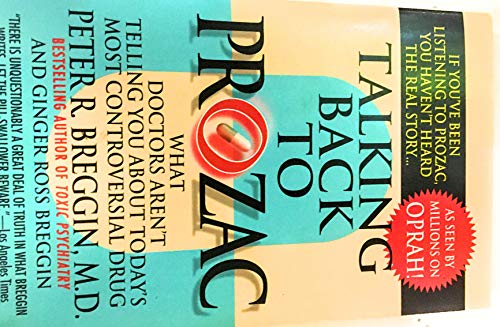Talking Back To Prozac
What Doctors Aren't Telling You About Today's Most Controversial Drug
Peter R. Breggin
BOOK REVIEW

In the pulsating heart of the pharmaceutical industry, few drugs have sparked as much debate and controversy as Prozac. Peter R. Breggin's Talking Back To Prozac: What Doctors Aren't Telling You About Today's Most Controversial Drug acts as both a revelatory exposé and a poignant plea for a critical reassessment of mental health treatment. Written in 1995, this book cuts through the glossy veneer of clinical efficacy and dives into the murky waters of psychiatric practices and the very foundations of contemporary mental health diagnoses.
Breggin's bold narrative challenges readers to question the status quo. Drawing upon his extensive background as a psychiatrist and a vocal critic of psychopharmacology, he lays bare the alarming truths about Prozac- touted as a miracle solution for depression. The underlying message? This so-called "magic pill" may not be the panacea many believe it to be. Those who embrace Breggin's insights can expect profound revelations about how these medications alter not just brain chemistry but also the very fabric of our emotional lives.
What makes Breggin's approach so refreshing is his commitment to humanizing the discourse around mental health. He implores us to view patients not merely as subjects for pharmacological experimentation but as individuals with unique stories, struggles, and strengths. Each chapter of Talking Back To Prozac functions as a cathartic argument against the heavy-handed approach of the modern psychiatric field, which often leans too heavily on medications while neglecting essential therapeutic practices. The author meticulously dissects the pharmaceutical industry's influence on prescribing habits and exposes the alarming ways that profit often trumps patient care.
Readers may feel anger rising in response to Breggin's revelations. Who hasn't been caught in the web of a system that prioritizes quick fixes over realistic, compassionate healing? Breggin's voice rings through the pages, demanding accountability from an industry that promises wellness but too often provides mere chemical band-aids on deep-seated psychological wounds.
Amidst the chaos of pharmaceutical marketing and the rush for prescriptions, his work resonates deeply with those fatigued by the overwhelming tide of antidepressants. Breggin offers a tantalizing notion: the possibility of reclaiming agency over one's mental health without relying solely on drugs. He is not advocating for a rejection of medication entirely, but rather an informed, cautious exploration of alternatives. This duality pulses with urgency, compelling us to reconsider what we deem safe and effective.
Readers have shared their fervent reactions to this book, and opinions vary wildly. Some hail Breggin as a savior of sorts-someone willing to defy the prevailing wisdom in the name of compassion. Others fiercely criticize his stance, labelling it as dangerously anti-science or dismissive of the lived experiences of those who rely on psychiatric medications for their survival. This spectrum of responses underscores the profound necessity for this conversation: Can we balance medication with holistic approaches to mental wellness?
The historical context in which Breggin writes enriches the reader's understanding. The pharmaceutical boom of the late 20th century aligned seamlessly with the rise of Prozac, a drug that promised liberation from the shackles of depression. Yet, Breggin's recounting speaks volumes about the ethical crossroads faced by medicine. A significant undercurrent in his book is the idea that every decision carries moral weight. It dares us to consider whether the alluring promise of quick psychological relief is worth the potential cost of our humanity.
Through the lens of Talking Back To Prozac, we are urged to connect dots that span the realms of science, ethics, and human experience. Breggin's narrative is an emotional rollercoaster, one that invites us to confront our fears about mental illness, the mainstream medical narrative, and the question of what it means to truly heal. Is it possible that in our rush to medicate, we might overlook the profound, necessary conversations that need to happen within ourselves and our communities?
In conclusion, grabbing a copy of Talking Back To Prozac might just be the most enlightening-perhaps even transformative-decision you make. This book is not merely an indictment; it's a call to action. You may find yourself reflecting on your perceptions of mental health, your assumptions about medication, and perhaps reshaping your personal narrative about life's struggles. As you delve into its pages, be prepared to engage with ideas that challenge, provoke, and ultimately inspire you to think deeply about your own journey toward wellness. 🌪 What are you waiting for? The discourse has only just begun!
📖 Talking Back To Prozac: What Doctors Aren't Telling You About Today's Most Controversial Drug
✍ by Peter R. Breggin
🧾 318 pages
1995
#talking #back #prozac #what #doctors #arent #telling #about #todays #most #controversial #drug #peter #breggin #PeterRBreggin